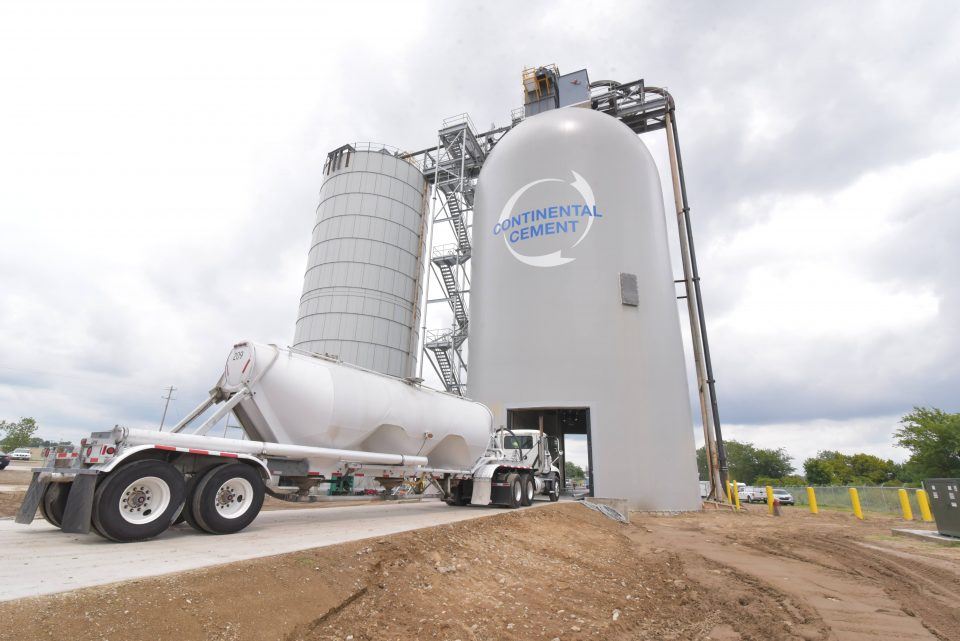Editor’s note: The following is an excerpt from an article published in the May 2017 issue of Dry Cargo International. For the full text, visit page 128 of the online edition.
Dome Technology has developed a Drive-Thru DomeSilo™ for cement and fly-ash storage, allowing companies to fill truck or rail directly from the storage structure and speeding up the process of product reception to delivery.
The Drive-Thru DomeSilo incorporates a fill pipe, storage vessel, ladder access, truck scale and appropriate foundation. “Cement companies can save on building a single drive-through storage facility by eliminating the need for multiple mechanical systems, two operators and multiple structures,” Roberts said, noting that the DomeSilo is less expensive to build than a silo of similar capacity.
The new model allows for direct load-out, where stored product flows through a hopper for direct load-out into the truck or rail. The dome will provide 100 percent live reclaim utilizing a fully aerated floor. “Dome Technology is providing a full turnkey system, not just the storage bin,” said consulting engineer Doug Weber of Engineering System Solutions.
According to Weber, the drive-through model could be used for applications like grain in the future, but the extremely active cement market took priority because demand for terminal storage is high. “Cement receiving, whether from a barge, shipping vessel or train, can be unloaded into the dome and then directly loaded into trucks or rail cars. This system directly competes with bolted steel tanks and drive-through concrete silos. Due to the unique construction techniques, this storage vessel is quickly constructed and very competitive,” Weber said.

The Drive-Thru DomeSilo can be used as a day bin when built on a small scale, but in actuality “it’s more like a drive-thru silo—it can store so much more than a typical steel day bin,” Roberts said. The dome’s dimensions will vary by project and customer need; the bin size will likely range from 1,500 to 15,000 tons and will work well storing the typical drive-through capacity of 4,000 to 10,000 tons. However, by utilizing a fluidized floor system, “you could easily apply this same concept to a 60,000-ton DomeSilo,” Dome Technology CEO Bradley Bateman said. “There is no limit on the storage size for this technology.”
Perhaps one point of interest is the range of benefits available with this model. According to Weber, the direct load-out system is cost competitive and reduces power consumption and overall maintenance as compared to a separate storage and load-out bin. Dome Technology has been building bulk-storage domes for more than 40 years, but “due to innovations in our construction process, it has now become possible to be competitive in the smaller-storage market,” Bateman said, adding that improvements in construction equipment have also increased the company’s ability to compete with storage of this scale. “With advances in technology and through our relationship with equipment manufacturers, we now have construction equipment that can be used to efficiently build this type of structure,” he said.
According to Roberts, the Drive-Thru DomeSilo will compete with steel bins and surpass the protection they offer. Constructed of reinforced concrete, the dome’s thermal mass will minimize condensation common with steel structures, so the product will develop fewer lumps. Also, steel bins sweat as temperatures change day to night. The DomeSilo will mitigate this concern based on mode of construction. A PVC membrane surrounding the entire dome prevents water and moisture from seeping in, blocking the introduction of outside water into the product. The dome’s insulated nature reduces heating and cooling of the walls and air inside, preventing condensation from forming on the interior. The concrete provides humidity control and moderate externally generated temperature fluctuations. A dome provides ideal conditions for stored materials requiring a controlled environment, Roberts said.